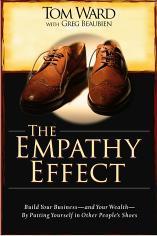 Your new post is loading...
 Your new post is loading...

|
Scooped by
Edwin Rutsch
April 13, 2011 7:32 PM
|
Empathy minimizes conflicts and promotes prosperity. In business, it creates a better experience for everyone involved—customers, employees and management.
Customers feel taken care of. Employees feel appreciated and become more loyal and efficient, strengthening the company and making it more profitable.
Empathy improves every situation it touches, setting off a chain reaction of positive events in a self-perpetuating circle that Tom Ward calls The Empathy Effect.

|
Scooped by
Edwin Rutsch
April 13, 2011 7:29 PM
|
So as I’m diving into research for this workshop on developing empathy in project managers, I’m overwhelmed by Google search results that show me exactly how much stigma and misinformation there is out there on the concept.
Informed solely by the various websites out there, empathy is something best taught to children, hippies, lousy doctors and people with Asperger’s Syndrome.

|
Scooped by
Edwin Rutsch
April 13, 2011 7:27 PM
|
My idea of EMPATHY is the ability to try to realize how other people feel and adjust one’s behavior to take into account these feelings.
As a marketer or sales person, understanding the feelings and needs of the customer is crucial to making that sale or exchange and for maintaining the long-term relationship. But yet, look at these people and organizations trying and sometimes failing to survive and how they have completely disregarded the concept of empathy.
===================== how they have completely disregarded the concept of empathy. ========

|
Scooped by
Edwin Rutsch
April 9, 2011 10:54 AM
|
Compassion has three main factors that can make a company more successful: - affective (I feel you),
- cognitive (I understand you),
- and motivational (I want to help you).
By being compassionate, the workers are driven to feel and understand what the customers’ or surroundings’ want. When they have those feelings, they will be more motivated to help the society be a better place for everyone.
Furthermore, it turns out that these three factors are the factors required for a good leader.

|
Scooped by
Edwin Rutsch
April 8, 2011 12:01 PM
|
New research suggests creativity in the workplace is enhanced by concern for others’ needs, and a willingness to walk in their shoes.
Creativity is usually thought of as internally motivated, but new research suggests that, at least in the business world, the link between inspiration and ingenuity is strengthened by focusing on the needs of others.
==================== the link between inspiration and ingenuity is strengthened by focusing on the needs of others. ===========

|
Scooped by
Edwin Rutsch
April 8, 2011 11:56 AM
|
In Dr. Judith Orloff’s book, Emotional Freedom: Liberate Yourself from Negative Emotions and Transform Your Life, she discusses the benefits – and dangers — of being empathic in the workplace. Here, we talk with her about how to best harness empathy for personal and professional success.
Why does empathy belong in the workplace?
In the book Emotional Freedom, my message is that empathy is the most beautiful quality in human nature. It means that you can put yourself in someone else’s shoes. It’s about having a gut feeling and intuition for how to communicate with others.
================== empathy is the most beautiful quality in human nature. =========
|

|
Scooped by
Edwin Rutsch
April 13, 2011 7:31 PM
|
Stop Training Customer "Service" and start training Customer EMPATHY!
"We define Customer Empathy as the ability to Identify, Understand, and Respond Appropriately to your customer's emotional state...before, during, and after the transaction."

|
Scooped by
Edwin Rutsch
April 13, 2011 7:28 PM
|
The power of watching and talking to real humans. - One of the core themes of my latest book, Good Boss, Bad Boss, is that the best bosses go to great lengths to develop empathy for both the people they lead and the customers served by their teams and organizations.
Managers and executives sometimes claim to me that just by looking at sales statistics, aggregated demographics stats, and -- now and then -- reading compilations of customer complaints and compliments is enough to understand their customer's needs.

|
Scooped by
Edwin Rutsch
April 8, 2011 12:21 PM
|
Intentional Workplace: Leadership and Emotional Contagion says: “Employees are not emotional islands.
Rather, they continuously spread their own moods, and receive and are influenced by others’ moods. When they work in groups, they can literally catch each other’s emotions like viruses, a phenomenon known as emotional contagion.”
A University of New Hampshire study took a look at how the emotions of leaders affects workers. The researchers were astounded at how thoroughly a leader’s own mood could spread among group members and how negative moods spread more pervasively than positive ones.

|
Scooped by
Edwin Rutsch
April 8, 2011 12:03 PM
|
The difference between healthy, unhealthy, and in-between workplace environments is usually tied to how those organizations treat their people.
Treating people uniformly with dignity (esteem, worthiness, honor), respect (regard, admiration, veneration), and compassion (empathy, sympathy, love) is often a prime differentiator.

|
Scooped by
Edwin Rutsch
April 8, 2011 11:58 AM
|
Face it: Most work environments during this recession are strained and stressed out. Perhaps you’ve been laid off or doing more work for less pay and shrinking benefits. …
That can generate a whole lot of stress, especially when management seems unable to feel your pain.
A recent MSNBC.com article looks at the benefits of empathy in the workplace. From the article: “Empathy has gotten a bad rap in the last 25 years in business,” says Dev Patnaik, author of “Wired to Care: How Companies Prosper When They Create Widespread Empathy.”
The best organizations (and the ones that survive economic tsunamis), he says, are those with empathetic cultures and managers who are able to step outside themselves and walk in someone else’s shoes.
====================== “Empathy has gotten a bad rap in the last 25 years in business,” =========

|
Scooped by
Edwin Rutsch
April 8, 2011 11:55 AM
|
We could all take a lesson from nurses about being empathetic. Time and again, nurses rate as the most trusted profession. They make people feel safe and cared for.
Even the best nurses, however, can learn tools for improving their empathy. In fact, most people who score high on assessments in the area of empathy often have no idea what they do; they just know that they like people, they enjoy working with and helping people, and they value people as individuals.
In a recent presentation to healthcare professionals on empathy in New York City, the audience concurred that healthcare professionals do exhibit empathy most of the time - to their patients. When asked about the use of empathy with colleagues or with family or even with themselves, the audience seemed pretty certain they could do a better job.
================ Even the best nurses, however, can learn tools for improving their empathy. ============
|



 Your new post is loading...
Your new post is loading...


















